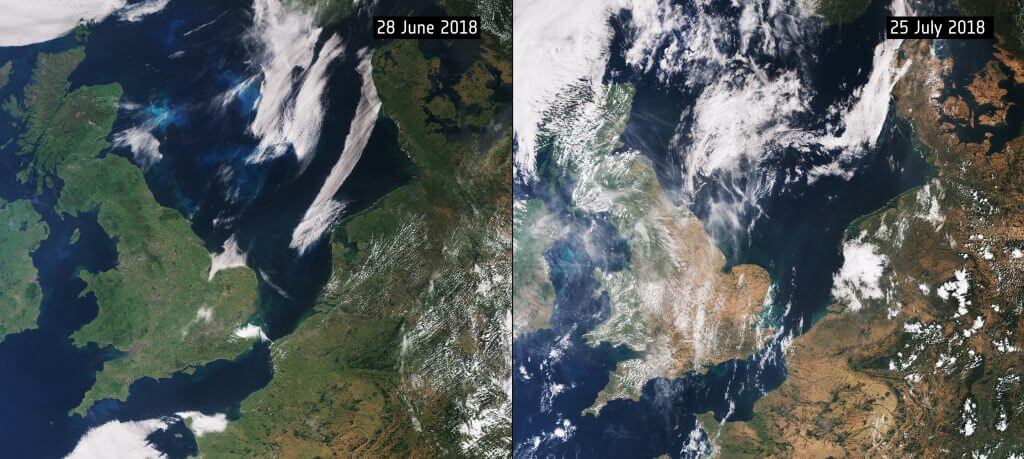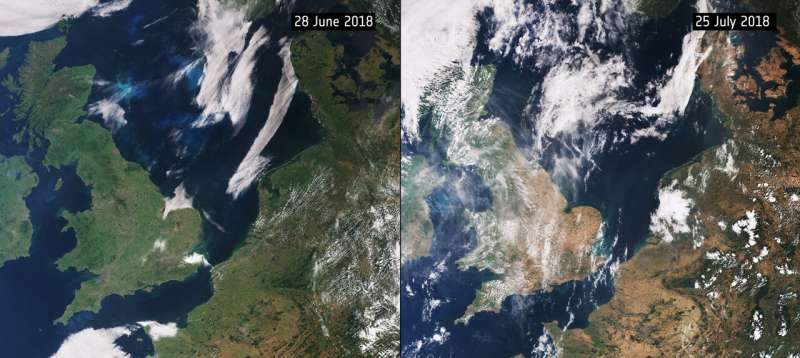
Strong European support for space to combat climate crisis (Image Credit: Phys.org)

Europe should demonstrate responsibility, leadership and autonomy in space—and its highest priority should be to address climate change, according to a poll of European citizens.
Almost nine out of ten people questioned said that collecting insights on climate change and understanding what is happening on Earth should be the most important use of space.
“This survey shows that the citizens of Europe strongly support investing in space to improve life on Earth—and that there is an increased appetite for a greater ambition for space in Europe. As world leaders meet for the 27th UN Climate Change Conference (COP27), European citizens want to see space used even more to monitor and mitigate climate change. We must act now to increase European autonomy, leadership and responsibility in space,” says Josef Aschbacher, Director General of ESA.
More than 21,000 people living in the 22 countries that are members of ESA responded to the survey, published today, which was conducted by pollsters Toluna and Harris Interactive between 25 September and 6 October. (View slides from the poll)
Satellite data underpins more than half of the essential climate variables identified by the UN’s Global Climate Observing System. Space helps scientists, policymakers and political leaders not only to monitor, understand, model and predict, but—crucially—to act on climate-induced and other crises.
The vast majority of people said that space is essential to further human knowledge of the universe—as well as to improving life on Earth through always-on-everywhere communication connections and navigation signals.
However, in the future, most Europeans would like greater emphasis to be put on monitoring and mitigating climate change, while continuing to better understand the universe and to benefit from satellite-empowered connectivity and navigation.
More than 80% of respondents also said that Europe should pool its space activities to compete with other space-faring nations—and that European space activities should be independent of decisions made by other major space powers.
Indeed, the desire for the pooling and independence of European space has increased significantly since the survey was last undertaken in 2019.
Among respondents in France, Germany, Italy, Spain and the U.K., some 84% of people favored joining together to compete with the United States, Russia, China, India and Brazil (a rise of 14 percentage points) and 81% said that European space activities should be independent (a rise of 17 percentage points).
When it comes to venturing into outer space, most people thought that cleaning up space debris was the highest priority. Some 86% said it was important, ahead of organizing a robotic exploration mission to Mars (77%), putting astronauts on the Moon (71%) and sending astronauts to Mars (70%).
However the importance of space exploration has greatly increased in people’s minds since the 2019 survey. Support for a robotic exploration of Mars rose by 18 percentage points among respondents in France, Germany, Italy, Spain and the U.K., while backing for astronauts on the Moon and on Mars rose by 18 percentage points and 16 percentage points, respectively.
The poll was conducted ahead of the ESA Council at Ministerial level, which will be held in Paris on 22nd and 23rd November. At the meeting, ESA’s member states, associated states and cooperating states will be invited to together strengthen Europe’s space ambitions and ensure that space continues to serve European citizens.
Provided by
European Space Agency
Strong European support for space to combat climate crisis (2022, November 15)
retrieved 16 November 2022
from https://phys.org/news/2022-11-strong-european-space-combat-climate.html
part may be reproduced without the written permission. The content is provided for information purposes only.





